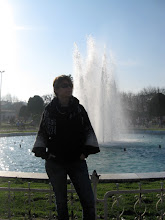The basic message is that we all suffer, and that the way out of suffering is to adjust to how life is instead of how we would have it be. The many steps to achieving this escape from suffering involve specifically perceiving our selves, our surroundings, and each other clearly, honestly and without judgement. It sounds simple, but it is extremely difficult to do. Even just looking myself straight on without either excuses or judgements is a huge challenge. How do I begin to apply this embrace to my environment? My loved ones? Strangers?
So, the question might be Why bother?, or How could doing so have anything to do with public health? This is a complex and multi-level conversation, so I would like to try one piece at a time. Here is the first piece of this puzzle:
Interconnectedness: Within the Buddhist philosophy, we are all connected with each other. We are of this planet, subsist on this planet, and will return to this planet. On a microbial level, the planet is on and in us. We are on and in the planet.
As we look at non-human ecosystems (lakes, woods, deserts, oceans), we are learning that that which impacts one member of the ecosystem impacts the whole. Take out the jelly fish, and their competitors, their prey, their prey's competitors, and their predators are all immediately impacted. Soon, the entire ocean is different.
Ultimately, public health is the health of each of us as a community. When we neglect members of our ecosystem -- our community -- the impact is immediately upon us all. When we allow some people to be treated less, we are all lessened. Understanding this, communicating this message, can be a key to changing our public health messages from blaming or helplessness to mutual benefit.
We also all need each other. This means that promoting healthy individuals and individual choices needs to reconnect us. We are living in a disconnected environment, where people too often do not know their neighbors. Research shows that people need community, need each other; elderly people who are connected to others -- family, religious organizations, volunteer work -- are healthier than their disconnected peers. We need health promotion that builds upon and strengthens our communities.
So, as a starting place, we need to start thinking of ourselves not as separate individuals, but as unique expressions of a larger whole. When we do, we realize that others are not other. Connecting to each, we can support each other and be stronger for it.


No comments:
Post a Comment